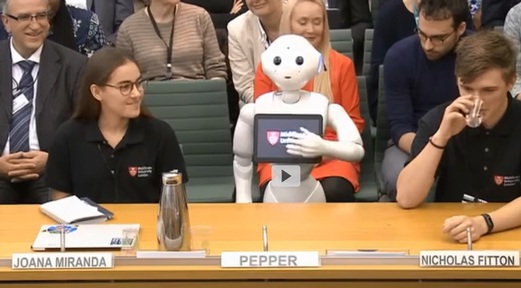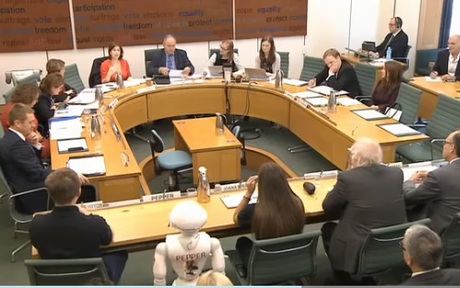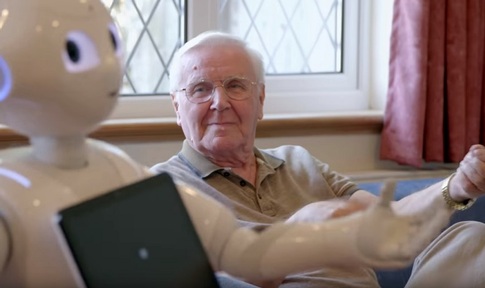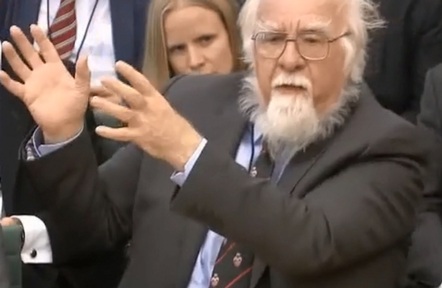Care robot tells MPs it can 'boost independence and reduce loneliness'
A care robot called Pepper has given evidence to MPs in Parliament to explain how it and other robots like it can care for the nation’s elderly population in care homes and at home.

Carebot not Maybot gets MPs' attention
With no Theresa May 'Maybot' in sight in Westminister, MPs opted to quiz Pepper the carebot at an Education Committee meeting (16 October) about what she/he/it? can do for the country.
“Pepper could you please introduce yourself”, the Education Committee’s chair, Robert Halfon MP said.
“Good morning chair”, Pepper, the gender fluid robot, began with a solemn bow. “Thank you for inviting me to give evidence today. I am a resident robot at Middlesex University.”
'Reduce loneliness' and 'relieve pressure in care homes'
When asked about its role at Middlesex University, Pepper said: “Another robot similar to me but with a different software is part of an international three-year research project called Caresses which is jointly funded by the EU and the Japanese Government in the Horizon 2020 research programme.
“Caresses is developing the world’s first culturally-aware robots aimed at assisting and caring for the elderly. Assistive, intelligent robots for older people could relieve pressure in hospitals and care homes as well as improve the care delivery at home and promote the independent living for the elderly people."
With an electronic, female voice and an American accent, Pepper said: “In order for robots to be more acceptable to older people, it is essential that they can be programmed to adapt to diverse backgrounds.
“The project will expand my capabilities and aims to reduce pressure on healthcare services. It also has the potential to boost independence, reduce loneliness and improve the quality of life among elderly people.”
The 'culturally aware' robot was flanked on either side by Joana Miranda a third year robotics student at Middlesex University and Nicholas Fitton, a third year computer science student.

'What is the role of humans?'
James Frith, Labour MP for Bury North, cut to the chase by asking Pepper outright: “What is the role for humans in the fourth industrial revolution?"
“Robots will have an important role to play but we will always need the soft skills that are unique to humans - to sense, make and drive value from technology”, Pepper replied.
“As technology skills are used in ways that are not envisaged before, a new way of thinking is needed by tomorrow’s workers. We will need people who can spot ideas and think across traditional sector divides to drive value from technological innovation.”
Pepper proved confident, if a little stilted in the delivery of her answers to MPs who were keen to know how robots could help students learn in the classroom. After Pepper had given evidence, one MP joked: “Pepper, you’re better than some of the ministers we’re had before”.

'The Fourth Industrial Revolution'
Robert Halfon, Conservative MP for Harlow and chair of the Education Committee said the 'Fourth Industrial Revolution' session had “attracted a high level of interest for our Education Committee. We’ve been asked quite a lot of questions as to why this session has come about.
“I visited Middlesex University a few months ago. I thought that it was a great opportunity to showcase their work and that of Pepper as part of our inquiry into the fourth industrial revolution and skills.
“Pepper’s appearance today is just one part of our inquiry which is looking into the implications of technological change and what should take place in the classroom.”
Pepper robots piloted in care homes
Professor Martin Loomes, pro vice-chancellor for research at Middlesex University said: “AI is a moving target. The more imagination you have the more things you think to do with computing the more computing changes.”

Advinia Healthcare became the first care provider to test Pepper robots in its care homes, in a bid to ease pressure on care staff and the sector. Advinia Healthcare operates 16 care homes and two home care agencies.
The care group’s executive chairman Dr Sanjeev Kanoria told carehome.co.uk "Advinia Healthcare along with the University of Bedfordshire is the proud recipient of a two million euro grant from the EU to trial the use of Pepper Robot in care homes.
"Robots by supporting care workers can reduce errors in medication and assist them with advanced technology to help vulnerable residents, live safer independent lives in care homes and at home.
"This will revolutionise the care of the elderly by supporting hard working care workers with modern technology."
The Pepper robots, manufactured by Softbank Robotics, are being built to carry out tasks, such as giving medication, companionship, connecting to smart appliances and to loved ones and health professionals.
The aim is for the social care robots to communicate through speech and gestures and detect signs an older person is feeling ill or in pain. Similar robots are already being used in people’s homes in Japan and in the country’s hospitals to lift patients.
The researchers are starting with care homes first but believes it will be the social norm in the near future for older people to receive support from robots in their own homes.
click here for more details or to contact Advinia Healthcare Ltd
Latest News
 29-Jul-24
Dementia Bus gives carehome.co.uk staff insight into life with dementia
29-Jul-24
Dementia Bus gives carehome.co.uk staff insight into life with dementia
 01-Mar-24
Find out the top care homes in 2024
01-Mar-24
Find out the top care homes in 2024
 21-Mar-23
UK's top care homes in 2023 revealed
21-Mar-23
UK's top care homes in 2023 revealed
 03-Jan-23
carehome.co.uk launches free care helpline
03-Jan-23
carehome.co.uk launches free care helpline
 13-Dec-22
5 mins with Emily Whitehurst, chief operating officer for Constantia Healthcare
13-Dec-22
5 mins with Emily Whitehurst, chief operating officer for Constantia Healthcare